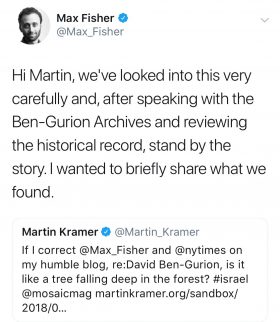 Max Fisher of the New York Times has taken to Twitter to defend his claim that David Ben-Gurion “emerged from retirement in July 1967 to warn Israelis they had sown the seeds of self-destruction.” According to Fisher (in an article that ran on the front page of the Times on July 23),
Max Fisher of the New York Times has taken to Twitter to defend his claim that David Ben-Gurion “emerged from retirement in July 1967 to warn Israelis they had sown the seeds of self-destruction.” According to Fisher (in an article that ran on the front page of the Times on July 23),
Ben-Gurion insisted that Israel give up the territories it had conquered. If it did not, he said, occupation would distort the young state, which had been founded to protect not just the Jewish people but their ideals of democracy and pluralism.
Fisher sourced this story (via a link in the online edition of the Times) to a recollection by the late Arthur Hertzberg, a noted Conservative rabbi. Hertzberg, writing in the New York Review of Books in 1987, claimed to have heard the grim prophecy during an encounter between Ben-Gurion and American Conservative rabbis at Beit Berl (near Kfar Saba) in July 1967.
As it happened, a few months ago I’d grown suspicious of this story, and so I tracked down the transcript of Ben-Gurion’s remarks in his archives. I found no evidence of his having said anything of the sort. I published my findings back in April, so imagine my surprise when Fisher ran with a lede repeating a fable I’d just debunked. My blog doesn’t have quite the circulation of the New York Times, but it’s where I pointed to the problem, and that brought it to the attention of Fisher and his newspaper.
Fisher now tweets to me that “we’ve looked into this very carefully and, after speaking with the Ben-Gurion Archives and reviewing the historical record, stand by the story.” I’m pleased that Fisher took my challenge seriously, and didn’t just blow it off. But I’m afraid he’s fallen well short of meeting it.
• •
Fisher’s first line of defense is that perhaps I’m not working from the correct transcript. He reports that he’s reached out to the Ben-Gurion Archives, “and the archivist said that the transcript you refer to could be from a different speech. It does not match the reported location, Beit Berl, and is only partial. They may simply not have the correct transcript on file.”
Sorry, Max, it’s not from a different speech. I’ve uploaded the transcript here. It’s dated July 12, 1967, the date of the meeting, and while it doesn’t specify any location, it records Ben-Gurion saying the following (at the start of the second paragraph): “I don’t have much to add to the remarks of Dr. Hertzberg.” Ben-Gurion even told an apt story: he’d once asked an Orthodox rabbi to explain how Conservative Jews differed from Orthodox ones. The Orthodox rabbi, “an honest man, answered that a Conservative Jew rides to the synagogue on the Sabbath because he doesn’t know it’s forbidden, while an Orthodox Jew also rides, [even though] he knows it’s forbidden.” So there’s no doubt whatsoever: I have the correct transcript. This is Ben-Gurion in the room with Hertzberg, bantering with the Conservative rabbis from America. Fact-check fail at the Times.
The twelve pages of the transcript don’t include even a hint that Ben-Gurion made the dramatic renunciation of territorial acquisition that Fisher, relying on Hertzberg, claims he made. Ben-Gurion alluded only once to a possible withdrawal: “If Nasser wants to take back the Sinai or a large part of it, let him make peace with us.” The transcript may be incomplete, a possibility I noted in my article. Still, while it is pointless to speculate on what else Ben-Gurion might have said, it would be bizarre if something as earth-shaking as a warning of Israel’s possible “self-destruction” didn’t make it into the transcript.
Or into Ben-Gurion’s diary, which I can now add as additional source. In his diary entry of July 12, Ben-Gurion summarized his own remarks. (This, after complaining that he had to sit through a long-winded speech by Hertzberg, who also introduced Ben-Gurion “with several inaccuracies about my life.”) Ben-Gurion’s own summary tracks the transcript, and includes nothing whatsoever on territorial concessions. I’ve uploaded it here.
Nor is there any corroboration in the Mapai party newspaper Davar of July 14. It summarized Ben-Gurion’s remarks to the Conservative rabbis (Ben-Gurion, it noted, “was preceded by a lecture by Prof. Hertzberg”). Here, too, as in the transcript, there is no attribution to Ben-Gurion of any territorial position, except this quote about Jerusalem: “We will not return Jerusalem—and no force in the world can take it from us.”
So we have three contemporary sources for this event, and not even one corroborates Hertzberg’s belated account of it.
 But “we don’t have to go off Hertzberg’s account,” Fisher suddenly announces, because “in any case, multiple historical accounts have independently reported that Ben-Gurion made a statement like this immediately after the war.” These “historical accounts” turn out to be a few screen shots of secondary works comprised of unsourced or fragmentary quotes about Ben-Gurion’s territorial desiderata. None has Ben-Gurion warning against “occupation” as a threat to Israel’s “democracy and pluralism.” And none qualifies as “immediately after the war.” Remember, the point of Fisher’s lede isn’t that Ben-Gurion was willing to trade territory for peace under certain conditions. It’s that Ben-Gurion supposedly warned that Israel would destroy itself if it didn’t retreat, and that he made such a prophecy as early as July 1967. Fisher brings no new evidence for either.
But “we don’t have to go off Hertzberg’s account,” Fisher suddenly announces, because “in any case, multiple historical accounts have independently reported that Ben-Gurion made a statement like this immediately after the war.” These “historical accounts” turn out to be a few screen shots of secondary works comprised of unsourced or fragmentary quotes about Ben-Gurion’s territorial desiderata. None has Ben-Gurion warning against “occupation” as a threat to Israel’s “democracy and pluralism.” And none qualifies as “immediately after the war.” Remember, the point of Fisher’s lede isn’t that Ben-Gurion was willing to trade territory for peace under certain conditions. It’s that Ben-Gurion supposedly warned that Israel would destroy itself if it didn’t retreat, and that he made such a prophecy as early as July 1967. Fisher brings no new evidence for either.
In fact, we already have a precise and authoritative statement of Ben-Gurion’s position “immediately after the war”: his personal press release that appeared in almost all the Hebrew newspapers on June 19. He issued it in order to banish any misunderstanding of his views, and I’ve uploaded a reproduction of the version published in Davar with the same purpose. I’ve also made a translation of its programmatic bullet points. Here we go:
• We are now in possession of the Sinai peninsula, the West Bank of the Land of Israel, the Syrian heights east of the Jordan river, Gaza, and the Old City of Jerusalem and its environs.
• We must be prepared to discuss peace with all our neighbors who fought us: Egypt, Syria, Jordan and Iraq. However, I am not sure the other side is prepared for that.
• If Egypt agrees to conclude a peace treaty with Israel—and commits to our freedom of navigation, not just in the straits of Eilat, but also in the Suez Canal—we will be ready to evacuate the Sinai desert immediately after the signing of the treaty.
• We will not discuss the Old City of Jerusalem and its environs with anyone. It was the capital of Israel at the time of King David, and so it will remain forever. The State of Israel will safeguard the holy places of the Christians and Muslims not less than [past] Muslim rule, or the rule of the Crusaders.
• We will propose to the inhabitants of the West Bank to choose representatives with whom we will conduct negotiations on a West Bank autonomy (excluding Jerusalem and its environs), which will be tied to Israel in an economic alliance, and which will have its outlet to the sea via Haifa or Ashdod or Gaza.
• A Jewish army will be stationed on the western bank of the Jordan river to protect the independence of the autonomous West Bank.
• The Gaza Strip will remain in Israel, and efforts will be made to resettle its refugees in the autonomous West Bank, or in other Arab territory, with the assent of the refugees and the assistance of Israel.
• If Syria agrees to sign a peace treaty, and commits to preventing attacks on Israeli settlements by Syria’s inhabitants and from within its territory, we will evacuate the Syrian [Golan] heights now in our hands.
• All the Jews who lived in Hebron and its surroundings will be allowed to return to their former homes, even after the West Bank is granted internal autonomy.
• We will propose a peace treaty to King Hussein between Israel and the East Bank of the Jordan, and will agree to give it an outlet to the Mediterranean, like that given to the West Bank.
In short: all of Jerusalem and Gaza to Israel, autonomy for the West Bank, the Israeli army on the Jordan river, and the return of territory to Egypt and Syria, but only in exchange for peace treaties. (Soon amended: he took the Golan off the table at the end of August.) In an interview published only three days before the Beit Berl meeting, Ben-Gurion elaborated: the West Bank should be a “protectorate” of Israel, and Israel should run its foreign affairs and defense. Any objective reader must agree that nothing in this program even faintly resembles “giv[ing] up the territories” to avoid “self-destruction.”
There’s also no doubt that Ben-Gurion, “immediately after the war,” thought that Israel should sit tight if the Arab states refused to negotiate for peace on Israel’s terms. Only five days after the Beit Berl meeting, Ben-Gurion wrote this in a personal letter: “I myself doubt whether Egypt or Syria is capable of sitting with us to discuss peace. May the government of Israel have the strength and the will to hold on to the conquered territories, when our neighbors refuse to discuss peace with us.” You read it right: that’s only five days after the alleged remarks at Beit Berl.
For the next few years, he remained fairly steady. In September 1969, Eliezer Livneh, a founder of Mapai who’d joined the “Greater Israel” movement, wrote to Ben-Gurion to ask for further clarification. His reply of September 30:
I said more than once to journalists that if there were a chance for “true peace” [shlom emet] (and by true peace I mean stability and common action in economics, politics, and education), I would be for the return of territories (except for the Old City of Jerusalem, the Golan Heights, and Gaza). But unfortunately I don’t see any proximate chance for true peace, and thus no room to speak about return of territories. Instead, we must take care to (1) promote increased immigration (without which the territories cannot be settled), (2) increase Jewish fertility (without which the Arabs will become a majority), and (3) be an exemplary people.
This perfectly summed up Ben-Gurion’s position until about 1970. In his own defense, Fisher brings a few quotes from the 1970s (coinciding with the War of Attrition with Egypt), in which Ben-Gurion seems more eager for compromise, at least with Egypt. In this phase, while he always insisted that Israel keep Jerusalem and the Golan Heights, he stopped mentioning Gaza, and sometimes even dropped his insistence on full, cooperative peace with Egypt. But towards the very end (he died in 1973), he drifted in the other direction, into open support of the settlements in the Sinai.
And while he favored autonomy over annexation of the West Bank, Hebron may have been another matter. In January 1970, he contributed a preface to a book on the Jewish presence there. “We will make a great and awful mistake,” he wrote, “if we fail to settle Hebron, neighbor and predecessor of Jerusalem, with a large Jewish settlement, constantly growing and expanding, very soon.” In 1972, he surprised many when he announced that the Jewish settlement in Hebron “should be able, in the fullness of time, to become a part of the state of Israel.”
• •
In sum, there’s no evidence that Ben-Gurion warned Israelis that their victory “had sown the seeds of self-destruction,” either in July 1967 or later.
Now I don’t expect working journalists to know all aspects of history, do original historical research, or read sources in foreign languages. History is an exacting profession, certainly no less than journalism. I do expect journalists to take notice when faced with the consensus of historians. Fisher writes that “we feel” that the lede of his article “constitutes accepted, established history and stand by the story.” To the contrary: I don’t believe a single competent Israeli historian or Ben-Gurion biographer would validate the story as it appears on page A1 of the New York Times. And although Hertzberg’s tale has been in print for over thirty years, you won’t find it repeated in any scholarly history or biography.
So the article in the Times simply recycles a myth. And it’s not the first time. Here is the late Anthony Lewis, in an opinion column in the Times, June 9, 1987: “Mr. Hertzberg heard a prophetic warning from David Ben-Gurion in July 1967, a month after the war. Ben-Gurion said it was urgent to return the captured territories at once, for holding on to them would distort and might ultimately destroy Israel.” The story seems irresistible, and the New York Times has a tradition of serving it up to readers, without ever fact-checking it.
I’m not paid to uphold the credibility of the Times, but let me offer a constructive suggestion to those who are. I knew Arthur Hertzberg, a man larger than life. It seems to me that Fisher has deprived him of his rightful place on the front page. Standing by the story really does mean standing by Hertzberg, so why not explicitly cite him as the source? (As Anthony Lewis did.) Put his name somewhere in the online version (“according to Rabbi Arthur Hertzberg”), so everyone will know that this account isn’t attested by any historical source. It’s an uncorroborated story told twenty years after the fact by an activist American rabbi with an agenda.
And no more than that.
